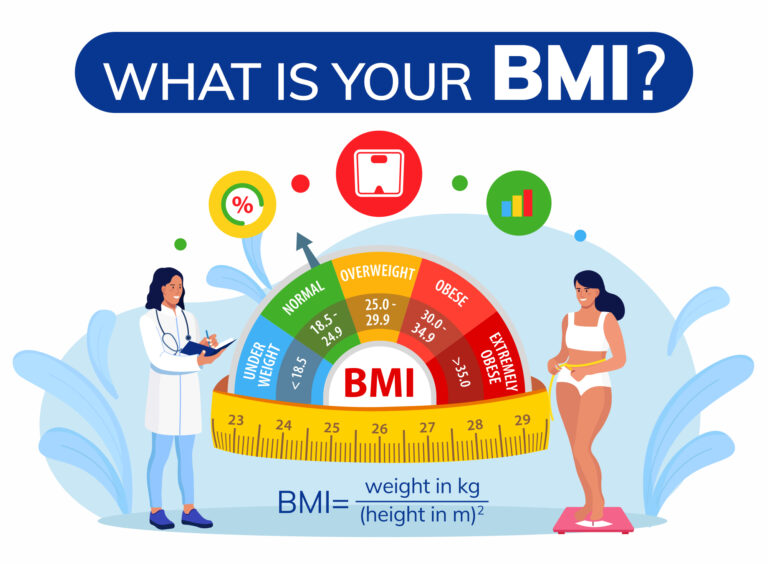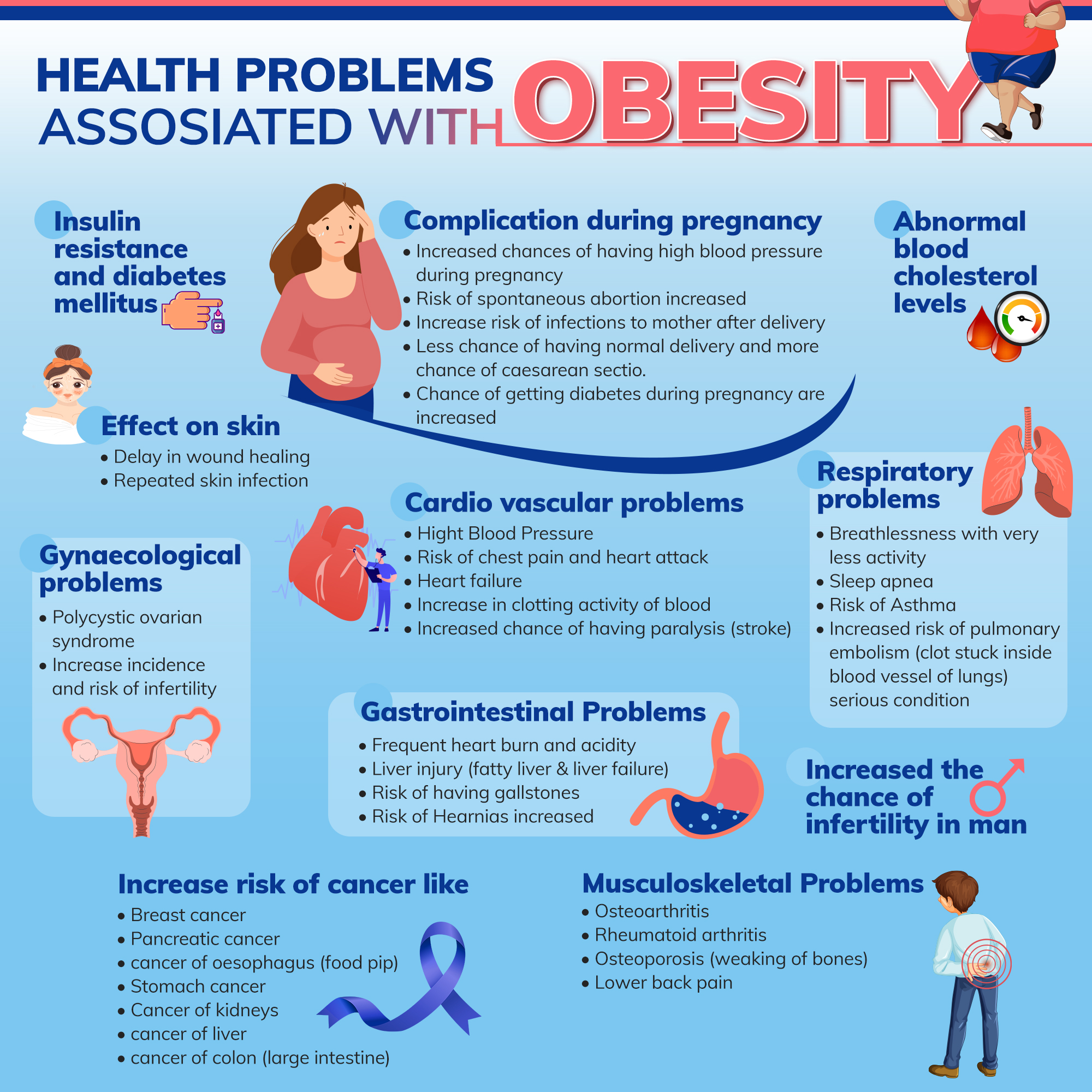
Obesity can be defined as a complex and chronic condition characterized by an excess accumulation of body fat that presents a risk to an individual’s health. It is often measured by the Body Mass Index (BMI), with a BMI of 30 or above indicating obesity. Obesity is generally a multi-factorial disease. If you are consuming high amounts of calories, particularly fat and sugars, and not burning those calories through exercise and physical activity, much of this superfluous energy will be stored by the body as body fat. Causes of Obesity are multifactorial, many of which are beyond control, including genetics, childhood habits, medical conditions, and hormones. Though becoming overweight may not be a choice and shedding those extra kilos may be difficult, but still you can lose weight if you wish to.

Obesity can be defined as a complex and chronic condition characterized by an excess accumulation of body fat that presents a risk to an individual’s health. It is often measured by the Body Mass Index (BMI), with a BMI of 30 or above indicating obesity. Obesity is generally a multi-factorial disease. If you are consuming high amounts of calories, particularly fat and sugars, and not burning those calories through exercise and physical activity, much of this superfluous energy will be stored by the body as body fat. Causes of Obesity are multifactorial, many of which are beyond control, including genetics, childhood habits, medical conditions, and hormones. Though becoming overweight may not be a choice and shedding those extra kilos may be difficult, but still you can lose weight if you wish to.
Body fat is hard to measure directly. So, it is often measured by body mass index (BMI). Body mass index (BMI) is a tool that doctors use to assess if a person is at an appropriate weight for their age, sex, and height. BMI measures weight related to height.

A BMI between 18-24.9 is normal, BMI between 25 and 29.9 indicates that a person is carrying excess weight. A BMI of 30 or over suggests that a person may have obesity.
Obesity is a major health crisis all over the world. It is the new pandemic to the society. There are several health conditions that are associated with obesity. These conditions often lead to a low quality of health and life of those affected. This is because obesity is the root cause of several serious medical problems, like:

Wonder why you always gain weight, despite dieting and exercise?
However, it is very difficult to sustain this due to the compensatory hormonal changes in the body which physiologically try to bring back the weight.
While diet and exercise alone may not be enough to cure obesity, they are still two of the best ways to prevent it. For treating morbid obesity and its associated complications, however, the researchers recommend considering biologically based treatment, including Bariatric/ Metabolic/ Diabetes surgery where appropriate.
One of India’s most highly trained and qualified bariatric surgeons, Dr. Amit Sood combines impressive experience with a deep knowledge of modern surgical techniques and a commitment to achieving the very best outcome for patients.

MBBS , MS , DNB , F GI & HPB , MAS , MARS
Minimal Access , Bariatric , Metabolic and Laparoscopic Surgeon
Dr. Amit Sood, who is the Founder & Director of CKOSMIC HEALTH CITY and his experience forms the core of the organization. He is one of the youngest Minimal Access, Bariatric, Metabolic, Laparoscopic and Endoscopic Surgeon in India and has also been awarded with a Gold Medal in surgery.in surgery.
Obesity can be determined by a person’s body mass index (BMI), calculated using height and weight. A BMI of 30 or higher is typically considered obese. However, other factors, such as muscle mass and distribution of fat, can also influence an individual’s health status. It’s essential to consult with a healthcare professional like Dr. Amit Sood to assess your specific situation and determine the best course of action for managing your weight.

Obesity can have a significant impact on fertility in both men and women. In women, obesity can disrupt hormone levels, leading to irregular menstrual cycles and ovulation problems. It can also increase the risk of conditions such as polycystic ovary syndrome (PCOS), which can further affect fertility. Additionally, obesity is associated with a higher risk of miscarriage and complications during pregnancy, such as gestational diabetes and preeclampsia.
In men, obesity can lead to hormonal imbalances, reduced sperm quality, and erectile dysfunction, all of which can contribute to fertility issues. Obesity may also increase the risk of conditions such as sleep apnea and diabetes, which can further impact fertility.
Best Bariatric Surgeon
Best bariatric surgeon in Punjab
Best bariatric surgeon in Moga
Best bariatric surgeon in Jalandhar
Best bariatric surgeon in Chandigarh
Best bariatric surgeon in Bathinda
Best bariatric surgeon in Amritsar
Best bariatric surgeon in Ferozepur
Best bariatric surgeon in Faridkot
Best bariatric surgeon in Jammu
Best weight loss surgeon
Top Bariatric Weight Loss Surgeon In Ambala
Weight Loss Surgery In Patiala
Best Weight Loss Surgery In Bathinda
Best weight loss surgeon in Moga
Best weight loss surgeon in Ludhiana
Best weight loss surgeon in Jalandhar
Best weight loss surgeon in Chandigarh
Best weight loss surgeon in Bathinda
Best weight loss surgeon in Amritsar
Best weight loss surgeon in Ferozepur
Best Weight Loss Surgery Hospital in Punjab
Important Links
About Dr. Amit Sood – Best Bariatric Surgeon
Contact Us
FAQ’S
Blogs
Ckosmic Health City
G.T. Road, Moga, Punjab, 142001
P. (+91) 73411-01891
P. (+91) 73411-01892
Important Links
About Dr. Amit Sood – Best Bariatric Surgeon
Contact Us
FAQ’S
Blogs
Ckosmic Health City
G.T. Road, Moga, Punjab, 142001
P. (+91) 73411-01891
P. (+91) 73411-01892
Copyright © Designed and Developed By Ckosmic Health City